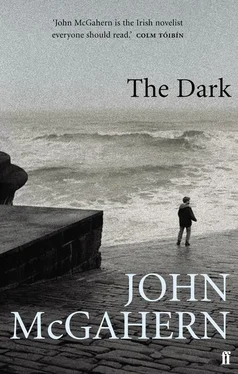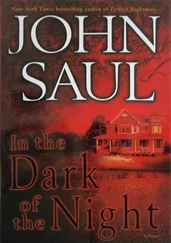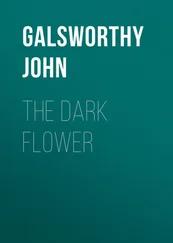John McGahern - The Dark
Здесь есть возможность читать онлайн «John McGahern - The Dark» весь текст электронной книги совершенно бесплатно (целиком полную версию без сокращений). В некоторых случаях можно слушать аудио, скачать через торрент в формате fb2 и присутствует краткое содержание. Год выпуска: 2002, Издательство: Penguin Books, Жанр: Современная проза, на английском языке. Описание произведения, (предисловие) а так же отзывы посетителей доступны на портале библиотеки ЛибКат.
- Название:The Dark
- Автор:
- Издательство:Penguin Books
- Жанр:
- Год:2002
- ISBN:нет данных
- Рейтинг книги:5 / 5. Голосов: 1
-
Избранное:Добавить в избранное
- Отзывы:
-
Ваша оценка:
- 100
- 1
- 2
- 3
- 4
- 5
The Dark: краткое содержание, описание и аннотация
Предлагаем к чтению аннотацию, описание, краткое содержание или предисловие (зависит от того, что написал сам автор книги «The Dark»). Если вы не нашли необходимую информацию о книге — напишите в комментариях, мы постараемся отыскать её.
The Dark — читать онлайн бесплатно полную книгу (весь текст) целиком
Ниже представлен текст книги, разбитый по страницам. Система сохранения места последней прочитанной страницы, позволяет с удобством читать онлайн бесплатно книгу «The Dark», без необходимости каждый раз заново искать на чём Вы остановились. Поставьте закладку, и сможете в любой момент перейти на страницу, на которой закончили чтение.
Интервал:
Закладка:
The father began to say something but stopped. The cockroaches were boldly coming out of their holes, sense of them crawling from all walls in the darkness, the moving mass of legs carrying the shining shells of their backs, black and reddish brown. When Mahoney moved one of them cracked under his loose boots.
“May God direct you. Go to your bed now. There’s no use hanging over the rakings in the dark.
18
ONE LONG GRIND OF STUDY FACED YOU THROUGH THAT WINTER if you were to get anywhere in the exams and the kitchen was no place for concentration. Preparing of meals or washing, someone sweeping the floor, the squabbles and the games of the children. Mahoney was hammering, the sharp crack of sprigs driven in, and the grating of the rasp on leather, confused into the moral character of Henry of Navarre. The will loosened. The page got blank, easier far to watch the shining balls of metal run hissing from the iron when he soldered an old saucepan. The guilt that you sat over books while he slaved into the night was driven home to the quick.
“Get the sprigs. We want to be finished before morning. We have to work. We can’t be planked over a book. We have to work.”
The blow sank in and brought blood to the face but there was too much control. The eyes slowly came up from the page and watched the large hands hammering. They bent down again with the half bitterness of a smile, they noted and kind of understood and they did not forgive, it was no house for reasonableness. You could only be silent and bow to it with as much detachment as you could get, and it might be right as anywhere else, it was simply the way the world was here, one day there might possibly be ferocity, but it was not to be this day.
When Mahoney was away they’d want to play: the rollicking blind-man’s-buff, chairs going over, everything in danger, the wild rushes of the blind man and the escaping. No matter how you tried resentment rose, and you cried at them in rage.
“Can you not go easy? How can I get much work done in that racket?”
They’d stop, go to their places or schoolbags, sit in suppression. You were their tyrant in place of Mahoney now, and you’d be too disturbed after to be able to concentrate again.
“Go on. Play away,” you’d get up in frustration and close the books, peace gone for that evening, and you’d watch them wary of you till they’d forget and grow intent as animals on their game, lost in the lamplight.
Impossible not to watch the slow hopscotch, whether the throw would find the chalked square, whether the piece of slate would remain steady on the head and hopping toe, fascination of eternal chance. Impossible too to refuse the invitation to join, see whether concentration and skill would defeat the limitations and traps, just for one game that so easily became several. The excitement of the danger of Mahoney coming never far, the slate picked up, the chalk marks obliterated by the wet brush kept handy, he’d have no chance to nag.
“Everything quiet of a sudden when I come, too quiet for good,” but there was nothing he could prove, they’d confront his suspicion with simple blankness.
No work much was got done. The weeks were going wasted.
“Can the man not keep quiet? Can he not sit? How can I go on? I must be going crazy,” you cursed, a night in late October, the kitchen hot and crowded, Mahoney’s hammer going ring-cling-cling on the rim of the bucket, the books useless on the table.
You might as well give up for good. It was useless trying. It was either give up, or go to one of the bedrooms upstairs where there was quiet. You’d freeze to death in those rooms without a fire, and to ask him for a fire was sure to rise trouble, but you were too driven desperate to care.
“I’m not able to study in this kitchen.”
“Why? What’s wrong with it?” he was immediately suspicious as always.
“There’s too much noise. I just amn’t able to concentrate.”
“I thought that if you had your mind enough on what you’re doing you’d be able to hear nothing else.”
“No. I can’t. The noise is driving me crazy.”
“Well, we can’t go round on tiptoe just for the one person. There’s too much to do in this house, things to fix, too much work to do, and it can’t be put on one side.”
“There’d be no need. I could do the study in one of the rooms upstairs, there’s an extra lamp.”
“It’s not the summer, you know.”
“We could put a fire down.”
“That’d be an extra fire in the house, wouldn’t it?”
“It would but it’d be only for a few hours. We could put it in your room. It’d take the damp out of the walls. You’re always saying it’s the coldest room in the house,” there was need for cunning once waste of money was in the air.
“So it is! It’d give you your death, that room would.”
“We can put the fire there then, it’d be killing two birds that way.”
“You might as well so if it’s that important but I’m telling you it’ll be all for nothing,” he consented. “And remember we can’t be going to Arigna for coal if the turf and sticks run out.”
The fire was lit each evening in the room, the globe cleaned, the lamp lit. You’d sit at the table between the fire and the brass bells of the bed and read and write, the oil-lamp burning above the quiet books, the clock ticking, and the room warm with the fire. Downstairs the racket went on, but it was far away, remote as the wind in the winter outside. Each night you had a set amount of work to get through. You willed to do it perfectly, though the calm act of sitting down at the table never came easy. You’d find books to fiddle with or poke the fire into flame or wander away on any dream or distraction. It was a kind of tearing the sitting down. Once you were working you didn’t mind, you didn’t think of any outside world, the first breaking of the ice to be calm and sit was the worst.
You had to grind to do well in June. It could only be done a night at a time. You didn’t know what you wanted to do with your life even if you did do well in June. June was as blank and distant as your death, with hot days perhaps. The only way to get release was to work. You’d not go down or stand aside, you’d ride on top of the others if you could, whatever security that’d give. It was too grisly to think, it was easier to work than to think. Death was all that mattered, it gave quickness, that was one accent you’d never lose. You didn’t have to say it out loud. Life was the attraction, every instinct straining its way, and it was whether to be blind and follow, and work was a way out. Pass the exam. Learn the formula. Things would come out that way.
One-two-three-four the reasons Napoleon failed at Waterloo. Get by heart passages of prose to support an answer to Addison’s style when you knew every characteristic of style except that it was simply the inexplicable way a man who usually donned britches in the mornings had of writing. Learn how to praise the sensuous mysticism, the haunting lyricism of Ode to the Nightingale if they asked for an appreciation: how Keats’s imagination was befogged by too much heavy sensuousness if a criticism was the order of the day. On and on, further rubbish by the ton, cram it into the skull, get a high place in the Exam, play up and play the game well, ride down the slowcoaches.
You’d rise hot and tired from it all at ten, worn out. Pleasant to gather slowly then the books for the morning and quench the lamp, go down and look at the scrubbed raw boards of the table and linger over a cup of tea. The mind was drained, it wanted no more than to look at the solidity of things in tiredness and contentment. It had worked well. It could do no more. That was a kind of satisfaction that was hard to lose before sleep.
Читать дальшеИнтервал:
Закладка:
Похожие книги на «The Dark»
Представляем Вашему вниманию похожие книги на «The Dark» списком для выбора. Мы отобрали схожую по названию и смыслу литературу в надежде предоставить читателям больше вариантов отыскать новые, интересные, ещё непрочитанные произведения.
Обсуждение, отзывы о книге «The Dark» и просто собственные мнения читателей. Оставьте ваши комментарии, напишите, что Вы думаете о произведении, его смысле или главных героях. Укажите что конкретно понравилось, а что нет, и почему Вы так считаете.












